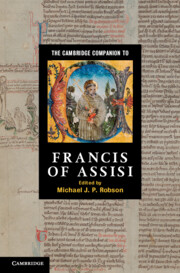Book contents
- Frontmatter
- Introduction
- PART I Francis of Assisi
- 1 Francis and the Franciscan movement (1181/2–1226)
- 2 The writings of Francis
- 3 The Rule and life of the Friars Minor
- 4 Francis and his hagiographical tradition
- 5 Voluntary simplicity: the attitude of Francis towards learning in the early biographies
- 6 Francis and the historiographical tradition in the order
- 7 Francis and Clare and the emergence of the Second Order
- 8 Francis and the encounter with the sultan (1219)
- 9 Francis and creation
- PART II The heritage of Francis of Assisi
- Index
5 - Voluntary simplicity: the attitude of Francis towards learning in the early biographies
from PART I - Francis of Assisi
Published online by Cambridge University Press: 28 November 2011
- Frontmatter
- Introduction
- PART I Francis of Assisi
- 1 Francis and the Franciscan movement (1181/2–1226)
- 2 The writings of Francis
- 3 The Rule and life of the Friars Minor
- 4 Francis and his hagiographical tradition
- 5 Voluntary simplicity: the attitude of Francis towards learning in the early biographies
- 6 Francis and the historiographical tradition in the order
- 7 Francis and Clare and the emergence of the Second Order
- 8 Francis and the encounter with the sultan (1219)
- 9 Francis and creation
- PART II The heritage of Francis of Assisi
- Index
Summary
The historical question of whether or not Francis approved of the pursuit of learning by the clerical Franciscans is a tough one in view of the scarcity of the evidence, and Bert Roest in Chapter 10 here offers an answer to this question. A medieval Franciscan who asked the same question had much less material in his hands for an answer than we do now. In the Middle Ages, with the exception of the Rule and the Testament, the writings of Francis remained inaccessible to the great majority of the friars who joined the order in places remote from Italy and who never had the chance to meet Francis or any of his early companions. If a clerical friar's conscience was burdened by a suspicion that his enthusiasm for the pursuit of booklearning was in conflict with the saintly founder's intentions, he could find no help in the Rule or the Testament. Francis did not approve of a quest for learning by illiterate friars, but he remained silent about the pursuit of learning by clerical friars. He did, however, prohibit the appropriation of things (which included books, with the exception of a breviary), but this ban ceased to be an obstacle to studying after the papal permission given to friars in 1230 to use things, including books. Francis's Testament was not helpful on the subject of learning either. Therein he admonished friars to respect theologians, but this hardly meant that he wished to see his brothers become theologians.
- Type
- Chapter
- Information
- The Cambridge Companion to Francis of Assisi , pp. 84 - 100Publisher: Cambridge University PressPrint publication year: 2011



